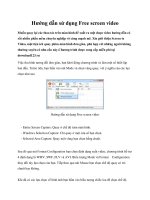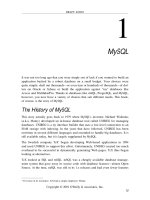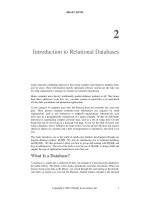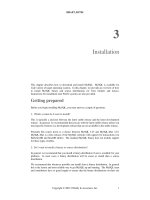Hướng dẫn sử dụng MySQL part 18 pdf
Bạn đang xem bản rút gọn của tài liệu. Xem và tải ngay bản đầy đủ của tài liệu tại đây (42.65 KB, 7 trang )
DRAFT, 8/24/01
Copyright
2001 O’Reilly & Associates, Inc.
1
21
MySQL System Tables
In Chapter XXX: Security we saw how MySQL used its own internal tables to store the
access information used to perform authentication. There are actually several internal
tables that are created as part of every MySQL server installation. MySQL uses these
tables for a variety of purposes.
Columns_Priv
+ + + + + + +
| Field | Type | Null | Key | Default | Extra |
+ + + + + + +
| Host | char(60) binary | | PRI | | |
| Db | char(64) binary | | PRI | | |
| User | char(16) binary | | PRI | | |
| Table_name | char(64) binary | | PRI | | |
| Column_name | char(64) binary | | PRI | | |
| Timestamp | timestamp(14) | YES | | NULL | |
| Column_priv | set(’Select’,’Insert’, | | | | |
| | ’Update’,’References’) | | | | |
+ + + + + + +
The columns_priv table controls column-level access to a MySQL database table. The
column-level check is the final check performed in the access verification sequence
describe in Chapter XXX: Security. The information in this table can be broken into four
sections: location, scope, privilege and timestamp.
Location
These fields determine to whom this privilege applies. Any user who matches both of
these fields in a given row will be subjected to the privilege rule for that row.
Host - The hostname or IP address of the user.
DRAFT, 8/24/01
Copyright
2001 O’Reilly & Associates, Inc.
2
User - The authenticated username of the user.
Scope
These fields determine exactly which column this rule is for. Any columns which match
all three of these fields in a given row will have the privilege rule for that row apply.
Db - The database that contains the table with the column
Table_name - The name of the table containing the column
Column_name - The name of the column
Privledge
The singe privilege column, Column_priv, determines which privileges are allowed for
location and scope defined in the other fields in this table. The value of this column is a
set that can contain any of the following privileges: Select, Insert, Update, References.
Chapter XXX: Security describes the meanings of the individual privilege options.
Timestamp
This field keeps a timestamp which records the last time the table was modified.
db
+ + + + + + +
| Field | Type | Null | Key | Default | Extra |
+ + + + + + +
| Host | char(60) binary | | PRI | | |
| Db | char(64) binary | | PRI | | |
| User | char(16) binary | | PRI | | |
| Select_priv | enum(’N’,’Y’) | | | N | |
| Insert_priv | enum(’N’,’Y’) | | | N | |
| Update_priv | enum(’N’,’Y’) | | | N | |
| Delete_priv | enum(’N’,’Y’) | | | N | |
| Create_priv | enum(’N’,’Y’) | | | N | |
| Drop_priv | enum(’N’,’Y’) | | | N | |
| Grant_priv | enum(’N’,’Y’) | | | N | |
| References_priv | enum(’N’,’Y’) | | | N | |
| Index_priv | enum(’N’,’Y’) | | | N | |
| Alter_priv | enum(’N’,’Y’) | | | N | |
+ + + + + + +
The db table controls database-level access to a MySQL server. The database-level check
is the second check (after user) performed in the access verification sequence describe in
Chapter XXX: Security. The information in this table can be broken into three sections:
location, scope and privilege.
DRAFT, 8/24/01
Copyright
2001 O’Reilly & Associates, Inc.
3
Location
These fields determine to whom this privilege applies. Any user who matches both of
these fields in a given row will be subjected to the privilege rule for that row.
Host - The hostname or IP address of the user.
User - The authenticated username of the user.
Scope
The sole scope field for this table, 'Db' determines exactly which database this rule is for.
Any database that matches this field in a given row will have the privilege rule for that
row apply.
Privledge
These fields determine which privileges are allowed for location and scope defined in the
other fields in this table. The values of all of these fields is an enumeration consisting of
either 'Yes' or 'No' depending on whether the privilege is allowed for a particular rule.
Select_priv - The Select privilege
Insert_priv - The Insert privilege
Update_priv - The Update privilege
Delete_priv - The Delete privilege
Create_priv - The Create privilege
Drop_priv - The Drop privilege
Grant_priv - The Grant privilege
References_priv - The References privilege
Index_priv - The Index privilege
Alter_priv - The Alter privilege
func
+ + + + + + +
| Field | Type | Null | Key | Default | Extra |
+ + + + + + +
| name | char(64) binary | | PRI | | |
| ret | tinyint(1) | | | 0 | |
| dl | char(128) | | | | |
| type | enum(’function’,’aggregate’) | | | function | |
+ + + + + + +
The func table contains a list of all currently active user defined functions. Chapter XXX:
Extending MySQL describes how to create a user defined function as well as how to use
the SQL commands CREATE FUNCTION and REMOVE FUNCTION to manipulate the
data in this table. It should be noted that the fields in this table merely contain the location
of the user defined function, not the function code itself; that is stored in a system-specific
dynamic library.
DRAFT, 8/24/01
Copyright
2001 O’Reilly & Associates, Inc.
4
name - The name of the user defined function. This name must match the name of the
C or C++ function within the dynamic library for this function.
ret - The return value of this function. This is stored as an integer that is keyed to an
enumeration defined in the standard MySQL C header file. A String return value is 0,
a real (floating point) numeric value is 1 and an integer numeric value is 2.
dl - The name of the dynamic library containing the function. This library must be
accessible to MySQL through the dynamic loading mechanism defined for the
MySQL server's system. For example, on most Unix systems, the library must be in a
directory within the LD_LIBRARY_PATH environment variable.
type - This field defines whether the function is a standard function (takes one or
more single-value arguments) or an aggregate function (is given a set of values on
which to perform an operation, as with the built-in MySQL functions SUM(),
COUNT() and AVG()). The value of this field is an enumeration which must be
either 'function' or 'aggregate'.
host
+ + + + + + +
| Field | Type | Null | Key | Default | Extra |
+ + + + + + +
| Host | char(60) binary | | PRI | | |
| Db | char(64) binary | | PRI | | |
| Select_priv | enum(’N’,’Y’) | | | N | |
| Insert_priv | enum(’N’,’Y’) | | | N | |
| Update_priv | enum(’N’,’Y’) | | | N | |
| Delete_priv | enum(’N’,’Y’) | | | N | |
| Create_priv | enum(’N’,’Y’) | | | N | |
| Drop_priv | enum(’N’,’Y’) | | | N | |
| Grant_priv | enum(’N’,’Y’) | | | N | |
| References_priv | enum(’N’,’Y’) | | | N | |
| Index_priv | enum(’N’,’Y’) | | | N | |
| Alter_priv | enum(’N’,’Y’) | | | N | |
+ + + + + + +
The host table controls remote host-level access to a MySQL server. The host-level
check is the third check (after user and db) performed in the access verification sequence
describe in Chapter XXX: Security. The information in this table can be broken into three
sections: location, scope and privilege.
Location
The sole location field, Host, determines to whom this privilege applies. Any user
connection from a host that matches this field in a given row will be subjected to the
privilege rule for that row.
Scope
The sole scope field for this table, 'Db' determines exactly which database this rule is for.
Any database that matches this field in a given row will have the privilege rule for that
row apply.
DRAFT, 8/24/01
Copyright
2001 O’Reilly & Associates, Inc.
5
Privledge
These fields determine which privileges are allowed for location and scope defined in the
other fields in this table. The values of all of these fields is an enumeration consisting of
either 'Yes' or 'No' depending on whether the privilege is allowed for a particular rule.
Select_priv - The Select privilege
Insert_priv - The Insert privilege
Update_priv - The Update privilege
Delete_priv - The Delete privilege
Create_priv - The Create privilege
Drop_priv - The Drop privilege
Grant_priv - The Grant privilege
References_priv - The References privilege
Index_priv - The Index privilege
Alter_priv - The Alter privilege
tables_priv
+ + + + + + +
| Field | Type | Null | Key | Default | Extra |
+ + + + + + +
| Host | char(60) binary | | PRI | | |
| Db | char(64) binary | | PRI | | |
| User | char(16) binary | | PRI | | |
| Table_name | char(60) binary | | PRI | | |
| Grantor | char(77) | | MUL | | |
| Timestamp | timestamp(14) | YES | | NULL | |
| Table_priv | set(’Select’,’Insert’,’Update’, | | | | |
| | ’Delete’,’Create’,’Drop’, | | | | |
| | ’Grant’,’References’, | | | | |
| | ’Index’,’Alter’) | | | | |
| Column_priv | set(’Select’,’Insert’, | | | | |
| | ’Update’,’References’) | | | | |
+ + + + + + +
The tables_priv table controls table-level access to a MySQL database. The table-level
check is the second to last check performed (before column-level) in the access
verification sequence describe in Chapter XXX: Security. The information in this table
can be broken into four sections: location, scope, privilege and other.
Location
These fields determine to whom this privilege applies. Any user who matches both of
these fields in a given row will be subjected to the privilege rule for that row.
Host - The hostname or IP address of the user.
User - The authenticated username of the user.
DRAFT, 8/24/01
Copyright
2001 O’Reilly & Associates, Inc.
6
Scope
These fields determine exactly which table this rule is for. Any table that matches both of
these fields in a given row will have the privilege rule for that row apply.
Db - The database that contains the table with the column
Table_name - The name of the table containing the column
Privledge
These fields determine which privileges are allowed for location and scope defined in the
other fields in this table.
Table_priv - The value of this field is a set that determines the privileges allowed for
the table(s) matching this rule. The values of this set can be any of the following:
Select, Insert, Update, Delete, Create, Drop, Grant, References, Index, and Alter.
Column_priv - The value of this field is a set that determines the privileges allowed
for all columns in the matching table(s). The values of this set can be any of the
following: Select, Insert, Update, and References. Chapter XXX: Security describes
the meanings of the individual privilege options.
Other
These fields store meta-data related to the access rule.
Timestamp – This field keeps a timestamp which records the last time the table was
modified.
Grantor – The user name of the user which created this rule. This field will only be
automatically populated if the rule was created using the SQL GRANT statement. If
a rule is created by manually adding a row to this table, this field must also be filled
in manually.
user
+ + + + + + +
| Field | Type | Null | Key | Default | Extra |
+ + + + + + +
| Host | char(60) binary | | PRI | | |
| User | char(16) binary | | PRI | | |
| Password | char(16) binary | | | | |
| Select_priv | enum(’N’,’Y’) | | | N | |
| Insert_priv | enum(’N’,’Y’) | | | N | |
| Update_priv | enum(’N’,’Y’) | | | N | |
| Delete_priv | enum(’N’,’Y’) | | | N | |
| Create_priv | enum(’N’,’Y’) | | | N | |
| Drop_priv | enum(’N’,’Y’) | | | N | |
| Reload_priv | enum(’N’,’Y’) | | | N | |
| Shutdown_priv | enum(’N’,’Y’) | | | N | |
| Process_priv | enum(’N’,’Y’) | | | N | |
| File_priv | enum(’N’,’Y’) | | | N | |
| Grant_priv | enum(’N’,’Y’) | | | N | |
| References_priv | enum(’N’,’Y’) | | | N | |
DRAFT, 8/24/01
Copyright
2001 O’Reilly & Associates, Inc.
7
| Index_priv | enum(’N’,’Y’) | | | N | |
| Alter_priv | enum(’N’,’Y’) | | | N | |
+ + + + + + +
The user table controls user-level access to a MySQL server. The user-level check is the
first check performed in the access verification sequence describe in Chapter XXX:
Security. The information in this table can be broken into two sections:
location/identification and privilege. Note the absence of the scope-related fields that are
present in all of the other security tables. As might be inferred from this, privileges set in
this table apply to every database, table and column in the server.
Location/Identification
These fields determine to whom this privilege applies. Any user who matches all three of
these fields in a given row will be subjected to the privilege rule for that row.
Host - The hostname or IP address of the user.
User - The username of the user.
Password - The password of the user.
Privledge
These fields determine which privileges are allowed for location and scope defined in the
other fields in this table. The values of all of these fields is an enumeration consisting of
either 'Yes' or 'No' depending on whether the privilege is allowed for a particular rule.
Select_priv - The Select privilege
Insert_priv - The Insert privilege
Update_priv - The Update privilege
Delete_priv - The Delete privilege
Create_priv - The Create privilege
Drop_priv - The Drop privilege
Grant_priv - The Grant privilege
References_priv - The References privilege
Index_priv - The Index privilege
Alter_priv - The Alter privilege
References_priv - The References privilege
Reload_priv - The Reload privilege
Shutdown_priv - The Shutdown privilege
Process_priv - The Process privilege
File_priv - The file privilege









